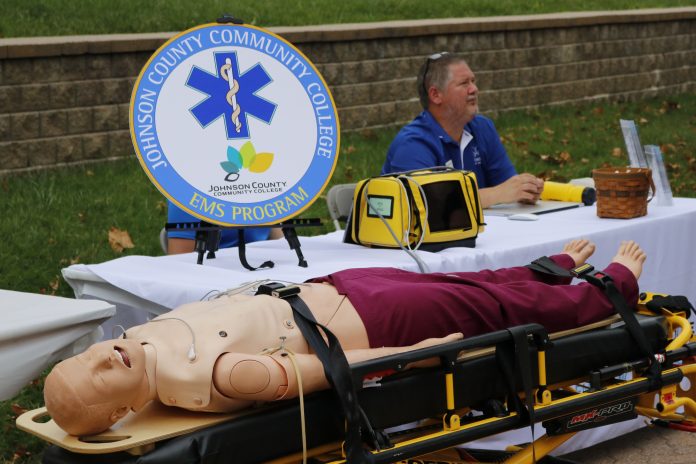
Pete Loganbill
Features editor
Barb Mahring, personal computer applications professor, was working on curriculum with her assistant dean like any typical work day when another professor came into the office, a look of panic on his face. He told Mahring that their colleague, Jerry Gordon, information technology professor, seemed to be having trouble breathing.
While her assistant dean called 911, Mahring went straight to the classroom Gordon was in.
“When I walked in, Jerry was sitting at the instructor station on a stool kind of hunched over and it was clear he was having difficulty breathing,” Mahring said. “There was a student, I didn’t realize he was a student at the time, but he was to the right of Jerry, and he was holding his arm because it was clear that maybe Jerry wasn’t very stable sitting on the chair. At this point, he was very labor breathing, eyes rolling back in his head, but the student the entire time kept his cool. He was talking in a very calm voice, he was very reassuring.”
On Monday, April 9, Gordon’s heart went into AFib, a condition which causes the heart rate to irregularly and rapidly increase and decrease. The incident took place after Gordon had dismissed the class early, thinking he just had to rest. However, a student stayed behind and was there when Gordon had to get help.
“I went into class,” Gordon said. “I had a burning in the top of my chest. I was having a problem breathing. I was sweating. Made it through the class. I sat down after everybody left and one of the students, he was working on something. Breathing just got worse and worse. Finally, I told him, ‘You need to go find someone to get some help.’ Which he did.”
Sebastian Di Paolo, student, didn’t really have anything to work on, he just sensed something was wrong, despite class seeming to end early for normal reasons.
“It didn’t seem unusual at all,” Di Paolo said. “It just seemed like, due to the quiz and the material being short, that it was going to be a short class. However, throughout the class, he did show signs of the stress. Trouble breathing, and he kept complaining about the heat, that it was very hot. I stayed behind, personally, because of a gut feeling. I stayed behind just to make sure everything was OK. Took my time packing my things.”
The first person Di Paolo could find was the professor who informed Mahring of the situation. He then went back to be with Gordon.
By the time the paramedics arrived, Gordon’s heart rate was drastically and quickly fluctuating.
“It wasn’t a danger of a heart attack so much, but the fact that the heart rate was back and forth, it could’ve very easily lead to a stroke had I not got some help and got it taken care of,” Gordon said.
When the paramedics took Gordon to Olathe Medical Center, Mahring told Di Paolo he was instrumental in helping his professor that day. Mahring said she believes the student is definitely on the right path as he is enrolled in the EMS program. This training taught him to check Gordon’s pulse and perfusion, and to keep asking him questions.
“He said he just followed his gut and he knew something was wrong,” Mahring said. “He knew the right things to do. He knew what to say. He knew how to handle the situation. I was very, I should say, somewhat emotional later in the day when it occurred to me that had he left that room, I don’t know when the next class began. I don’t know how long it would have been before help would’ve arrived.”
While Di Paolo thinks what he learned in the EMS program is valuable, he believes the most helpful action he took was simply getting someone else to assist Gordon.
“The training that I got here is amazing; however, in that situation, the best thing that I did is probably stayed after a couple of minutes and gotten help,” Di Paolo said. “It wasn’t anything, I knew how to check his pulse, I think it didn’t matter. I think it mattered that I got help.”
Gordon is very thankful Di Paolo was there at the time.
“He simply did what I asked him to do,” Gordon said. “He didn’t try to do anything that he wasn’t trained to do. I just asked [him] to go see if [he] could find some help and that’s exactly what he did. It was just one of those things and I was glad he was there.”
After being in the hospital for four days, Gordon took a week off to be at home. He is now back teaching at the college.
When a student sees someone in a medical emergency, the police department is fine with someone rendering aid if they believe they can, as this student could.
“We have a fair amount of medical calls here,” said Dan Robles, Crime Prevention Officer. “What we suggest people do, whether it be a faculty, staff, or student here is, you can render aid immediately, but I think one of the first things you want to do, unless it’s [a] very critical situation is to give us a call. You can go to any of the phones inside campus and dial 4111 or 4112, and it will ring directly to our dispatcher.”





















